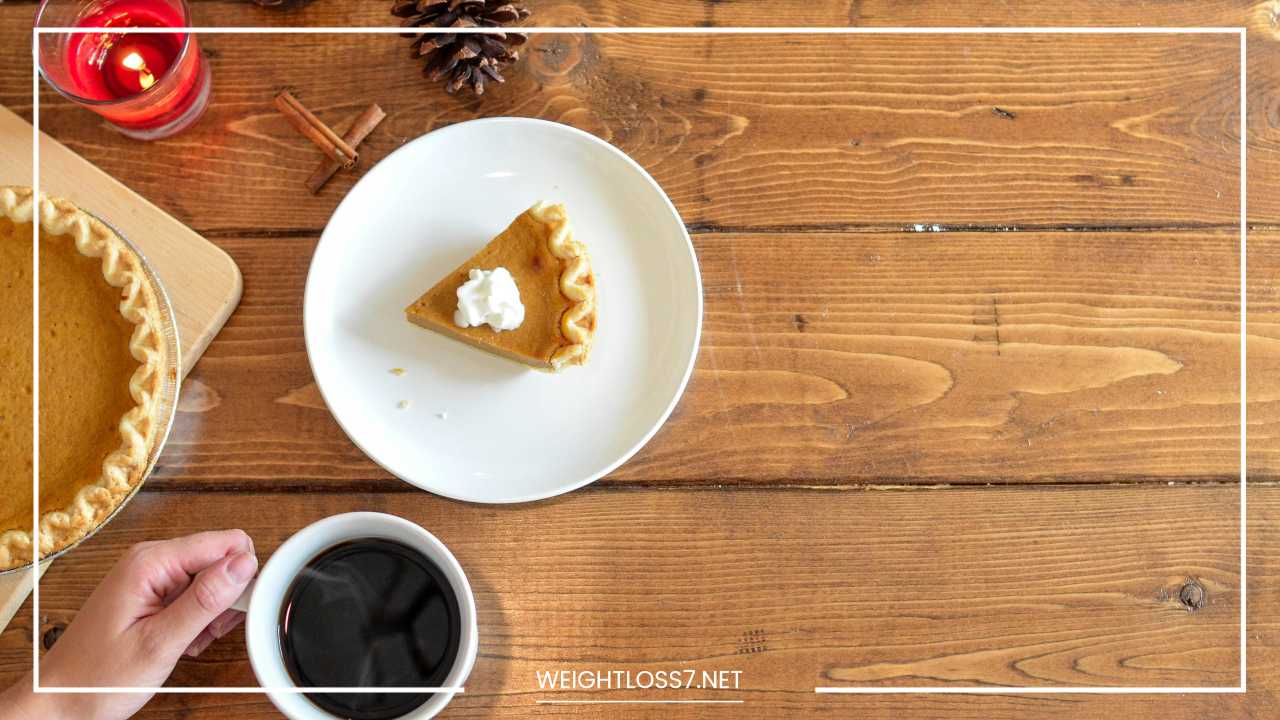How to Lose Holiday Weight Gain Fast

Holiday Weight Gain
Shedding Those Holiday Pounds: A Comprehensive Guide to Healthy Weight Loss
The holidays are a whirlwind of joy, family gatherings, and of course, delicious food. But amidst the twinkling lights and carols, it’s easy to indulge a little too much. Come January, the remnants of those festive feasts can leave you feeling a bit heavier than usual.
Don’t despair! While crash diets and extreme exercise routines may seem tempting, sustainable and healthy weight loss is the key to long-term success.
This comprehensive guide equips you with effective strategies to shed those holiday pounds in a way that nourishes your body and mind. We’ll delve into creating sustainable habits that not only promote weight loss but also improve your overall well-being.
Understanding Weight Gain and Setting Realistic Goals
Holiday weight gain often stems from a combination of factors: increased calorie intake, richer foods, and less physical activity. It’s important to remember that a few extra pounds gained over the holidays won’t derail your health goals.
Aiming for a gradual weight loss of 1-2 pounds per week is a safe and sustainable approach. This allows your body to adjust to the changes you’re making and reduces the risk of regaining weight later.
Making Sustainable Diet Changes for Long-Term Success
Crash diets and restrictive eating plans might offer the allure of quick weight loss, but they’re often unsustainable and can be detrimental to your health. Here’s how to make smart dietary changes that will help you lose weight and keep it off for good:
- Embrace Whole Foods: Fill your plate with a vibrant symphony of colors – fruits, vegetables, whole grains, and lean protein sources. These whole, unprocessed foods are packed with essential nutrients that keep you feeling full, energized, and satisfied.
- Portion Control is Your Ally: Pay close attention to serving sizes. Use smaller plates and bowls to avoid overeating. Consider measuring out portions beforehand to prevent mindless snacking.
- Don’t Skip Meals: Skipping meals can disrupt your metabolism and lead to overeating later in the day. Aim for regular meals and healthy snacks throughout the day to keep your metabolism humming and prevent blood sugar crashes.
- Limit Processed Foods: Processed foods often lurk with hidden dangers – high calories, unhealthy fats, and added sugars. These can sabotage your weight loss efforts. Opt for whole, unprocessed foods whenever possible.
- Hydration is Key: Drinking plenty of water can help curb cravings and keep you feeling full. Aim for eight glasses of water per day. However, listen to your body – if you’re feeling thirsty, don’t hesitate to reach for more water.
- Mindful Eating is a Powerful Tool: Slow down and savor your food. Put away distractions like your phone or TV while eating. Pay attention to hunger and fullness cues. Stop eating when you’re comfortably full, not stuffed.
Smart Snacking Strategies to Keep You on Track
Healthy snacks can be your best friend when it comes to weight loss. They help you stay feeling full and prevent overeating at mealtimes. Here are some great snack options to keep on hand:
- Fruits and vegetables with a dollop of nut butter: This provides a satisfying combination of fiber, healthy fats, and protein, keeping you feeling full for longer.
- Air-popped popcorn: A surprisingly filling snack that’s low in calories and high in fiber. Add a sprinkle of cinnamon or herbs for extra flavor.
- Greek yogurt with berries: Packed with protein and probiotics, Greek yogurt promotes gut health and keeps you feeling satisfied. Top it with berries for a burst of sweetness and antioxidants.
- Hard-boiled eggs: A convenient and portable source of protein that keeps you feeling full for longer.
- Handful of nuts and seeds: Nuts and seeds offer a satisfying combination of healthy fats, protein, and fiber. However, be mindful of portion sizes, as they are calorie-dense.
- Cottage cheese: A low-calorie, high-protein snack that can be enjoyed on its own or with chopped vegetables or fruit.
The Power of Protein for Weight Loss
Protein is a nutritional powerhouse for weight loss. It helps you feel full for longer, reduces cravings, and can even boost your metabolism. Include protein sources like lean meats, poultry, fish, beans, lentils, tofu, tempeh, and nuts in your meals and snacks.
Don’t Ditch the Carbs Entirely: Carbs Can Be Your Friend
Complex carbohydrates from whole grains provide your body with sustained energy, helping you power through your workouts and daily activities.
Choose whole grains like brown rice, quinoa, whole-wheat bread and pasta, and oats over refined carbohydrates like white bread, white rice, and sugary cereals. Refined carbohydrates can cause blood sugar spikes and crashes, leading to increased hunger and cravings.
Embrace the Art of Healthy Cooking at Home
Cooking at home allows you to control the ingredients in your meals, which is a game-changer for weight loss. You can limit unhealthy fats, added sugars, and sodium, ensuring your meals are not only delicious but also contribute to your weight loss goals.
Explore healthy recipes online or in cookbooks to find a variety of flavorful and nutritious meal options.
The Importance of Exercise for Weight Loss and Overall Health
Exercise is an integral part of the weight loss equation. It not only helps you burn calories but also offers a plethora of health benefits, including improved cardiovascular health, stronger muscles and bones, and reduced stress.
Aim for at least 150 minutes of moderate-intensity exercise or 75 minutes of vigorous-intensity exercise per week. Here are some tips to incorporate regular exercise into your routine:
- Find activities you enjoy: This could be walking, running, biking, swimming, dancing, team sports, yoga, Pilates, or anything that gets you moving and your heart rate up. When you enjoy your workout, you’re more likely to stick with it in the long run.
- Start slow and gradually increase intensity and duration: Don’t try to go from couch potato to marathon runner overnight. Begin with shorter workouts and gradually increase the duration and intensity as you get fitter. This helps prevent injuries and keeps you motivated.
- Strength Training is Key: Building muscle mass helps boost your metabolism and burn more calories even at rest. Include strength training exercises that target all major muscle groups 2-3 times per week. You can use bodyweight exercises, free weights, resistance bands, or weight machines.
Developing Sustainable Habits for Long-Term Weight Loss Success
Developing sustainable habits is the cornerstone of long-term weight loss success. Here are some tips to help you stay on track:
- Focus on progress, not perfection: There will be setbacks along the way. Don’t get discouraged by occasional slip-ups. Focus on making healthy choices most of the time, and you’ll be well on your way to your goals.
- Find an accountability partner: Having a friend, family member, or weight loss buddy to support and motivate you can be incredibly helpful.
- Make healthy swaps: Don’t feel like you have to deprive yourself completely. Find healthy alternatives to your favorite treats. For example, swap sugary sodas for sparkling water with a squeeze of fruit, or bake homemade cookies with whole wheat flour and less sugar.
- Plan your meals and snacks: Planning your meals and snacks in advance helps you make healthy choices and prevents unhealthy impulse decisions.
- Don’t be afraid to ask for help: If you’re struggling with weight loss, consider consulting a registered dietitian or certified personal trainer. They can provide personalized guidance and support.
Additional Tips and Strategies for a Well-Rounded Approach
- Get Enough Sleep: Aim for 7-8 hours of quality sleep per night. Lack of sleep can disrupt hormones that regulate appetite and metabolism, making it harder to lose weight.
- Manage Stress: Chronic stress can lead to weight gain. Find healthy ways to manage stress, such as yoga, meditation, deep breathing exercises, spending time in nature, or listening to calming music.
- Track Your Progress: Keeping a food diary or using a fitness tracker can help you stay accountable and motivated. Track your calorie intake, exercise routines, and weight to monitor your progress and adjust your plan as needed.
- Celebrate Your Non-Scale Victories: Weight loss isn’t just about the numbers on the scale. Celebrate your non-scale victories too, such as having more energy, fitting into your favorite clothes again, or feeling stronger.
- Make it a Lifestyle Change, Not a Diet: View your healthy habits as a lifestyle change, not a temporary diet. This shift in mindset will help you maintain your weight loss and improve your overall health for the long term.
Remember: Weight loss is a journey, not a destination. By incorporating these healthy and sustainable strategies into your life, you can shed those holiday pounds and achieve lasting success.
Embrace the process, celebrate your victories, and enjoy the journey towards a healthier and happier you.
Advanced Strategies for Weight Loss Enthusiasts
This section dives deeper into some advanced strategies for weight loss enthusiasts who are looking to optimize their results.
-
Intermittent Fasting: Intermittent fasting (IF) involves cycling between periods of eating and fasting. There are various methods of IF, with the most popular being the 16/8 method (fasting for 16 hours and having an eating window of 8 hours). IF can be a powerful tool for weight loss, but it’s crucial to consult with your doctor before starting, especially if you have any underlying health conditions.
-
Mindful Eating Techniques: Mindfulness practices can enhance your relationship with food and promote weight loss. Techniques like mindful meditation and mindful eating can help you become more aware of your hunger and fullness cues, allowing you to eat intuitively and avoid emotional eating.
-
Strength Training Beyond the Basics: While basic strength training is beneficial, weight loss enthusiasts can explore more advanced techniques like progressive overload (gradually increasing weight or difficulty) and supersets/compound sets (combining exercises that target different muscle groups) to maximize muscle growth and boost metabolism.
-
Macronutrient Tracking: For those comfortable with a more data-driven approach, tracking macronutrients (carbs, protein, and fat) can be helpful. This allows for precise calorie control and ensures you’re meeting your nutritional needs while promoting weight loss. Consulting a registered dietitian can help you create a personalized macronutrient plan.
-
Supplements for Weight Loss: Some supplements like protein powder, creatine, and glutamine can be beneficial for weight loss depending on your goals and exercise routine. However, it’s important to note that supplements should not be a replacement for a healthy diet and exercise plan. Consult with a healthcare professional before starting any supplements.
Remember: These advanced strategies are not for everyone. It’s crucial to listen to your body and choose approaches that align with your health goals and lifestyle.
Final Word
Shedding holiday pounds and achieving lasting weight loss is a journey. By incorporating the tips and strategies outlined in this guide, you can develop healthy habits that not only help you lose weight but also improve your overall well-being.
Remember, focus on progress, not perfection. Celebrate your victories, big and small, and enjoy the empowering process of creating a healthier and happier you.

















